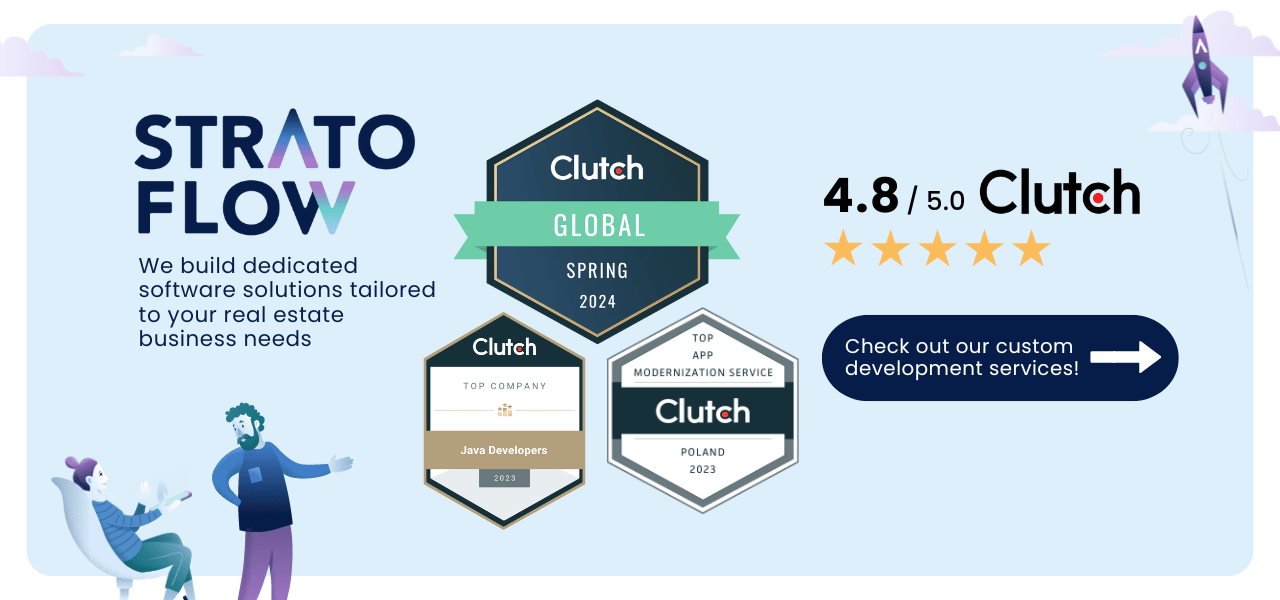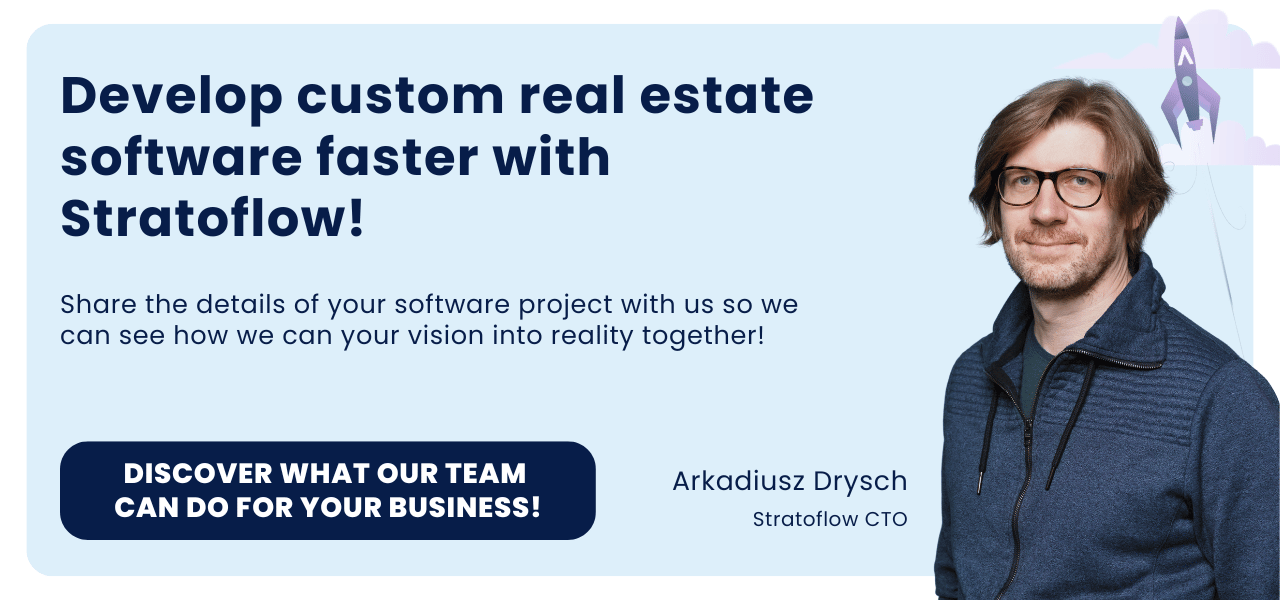
How AI in Real Estate Is Redefining The Industry in 2024
Artificial intelligence (AI) is one of the most influential technological trends in recent years, and it is now being used in the real estate market as well.
AI is providing unprecedented tools and capabilities that are transforming how properties are valued, marketed, designed, and managed.
From virtual staging with generative AI to predictive analytics enhancing property valuations and customer interactions, AI’s role in real estate is expanding rapidly. As we move through 2024, these technologies are becoming essential for staying competitive in a rapidly evolving market.
Contents
- Applications of AI in Real Estate: Eight Key Examples
- Eight Best Property Management Software Currently On the Market
- Openkoda Property Management System
- Smart Property Recommendations Engines
- Rex: AI Voice Assistant
- Compass: AI-enabled CRM System
- CoreLogic: AI Real Estate Platform
- Virtual Staging and Interior Design
- Smart Home Integration
- Enhanced Lead Generation and Marketing
- Prepare for the Future: New Development In The Artificial Intelligence Field
What Is AI and How It Is Influencing The Real Estate Industry?
Artificial intelligence (AI) is drastically reshaping the real estate industryby enhancing the efficiency and accuracy of various operations through advanced real estate software.
In essence, AI refers to the capability of a machine to imitate intelligent human behavior.
AI works by using algorithms and statistical models to process complex data inputs, make decisions, and learn from outcomes, often using techniques such as machine learning where patterns and inferences are derived without human intervention.
It is becoming increasingly crucial across many sectors, and in real estate, it is transforming everything from property management to customer interactions.
The real estate market is experiencing a surge in AI adoption with significant financial implications. For instance, the AI market in real estate was valued at approximately $164.96 billion in 2023 and is projected to grow to $226.71 billion in 2024, marking a remarkable compound annual growth rate (CAGR) of 37.4%.
This rapid growth underscores the pivotal role AI plays in enhancing market analytics, improving property search capabilities, and automating building management processes, among other functions.
The transformative impact of AI is not limited to automating tasks; it also creates new opportunities for growth and innovation within the industry. As the technology matures, it promises to unlock even more sophisticated capabilities, further revolutionizing the real estate landscape.
Types of Artificial Intelligence You Need to Know
As the real estate industry continues to embrace technological advancements, understanding the types of Artificial Intelligence (AI) that are influencing the sector is crucial.
Three main types of AI – Predictive Analytics, Generative AI, and Computer Vision – are at the forefront of this transformation.
Each offers unique capabilities and benefits that can significantly impact real estate operations from property management to sales and customer engagement.
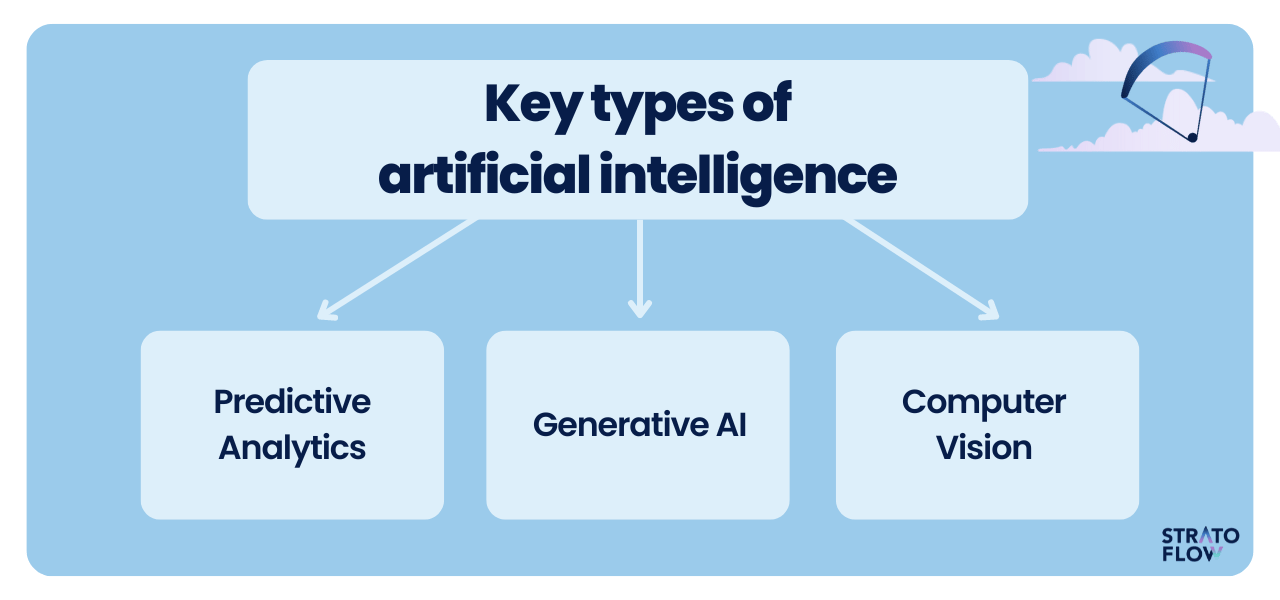
Predictive Analytics
The first type of AI is predictive analytics.
This technology applies machine learning algorithms to data patterns to predict outcomes.
In the real estate sector, predictive analytics AI can be incredibly valuable.
For instance, predictive AI in the real estate industry enhances efficiency by analyzing historical data and current real estate trends to forecast property values and investment risks, empowering companies with strategic insights for smarter decision-making.
It optimizes resource allocation by predicting peak periods for buying or selling properties, allowing companies to tailor their staffing and marketing efforts accordingly.
Additionally, predictive AI can identify potential property maintenance issues in properties before they occur, enabling preemptive actions that reduce downtime and cost, while improving tenant satisfaction and retention.
Generative AI
Generative AI refers to artificial intelligence systems that can create new content, such as text, images, or music, by learning patterns from large datasets. This enables them to generate outputs that mimic human creativity.
This technology has surged in popularity in 2023 due to its versatility, finding applications in diverse fields such as entertainment, where it crafts personalized media, to scientific research, where it aids in drug discovery and predictive modeling.
As AI tools become more accessible and user-friendly, they’re being integrated into everyday technology, leading to a proliferation of creative and practical AI-generated solutions that capture the public’s imagination and drive industry innovation.
In real estate, generative AI has transformative potential, particularly in marketing and sales.
AI can assist in generating accurate and comprehensive property descriptions, as well as preparing marketing materials faster and more efficiently.
Additionally, AI-driven tools can streamline document processing and compliance checks, reducing manual effort and increasing efficiency in transactions, thereby transforming traditional real estate operations into more agile and customer-focused practices.

Computer Vision
Computer Vision involves training computers to interpret and understand visual information from the world, which they acquire through images and videos.
This AI type processes this data to recognize patterns, objects, and even actions. In real estate, Computer Vision can revolutionize property listings by analyzing images to identify and tag key features automatically or assess property conditions.
It also plays a crucial role in enhancing property security systems through its ability to recognize and alert for unusual activities, contributing to safer property environments.
Moreover, Computer Vision can assist in automating inspection processes by providing detailed assessments through image analysis, which can be particularly useful for property maintenance and appraisals.
[Read also: A Comprehensive Guide to Digital Transformation in Real Estate]
AI in Real Estate: Strategy For Your Business
As previously mentioned, integrating artificial intelligence (AI) solutions in real estate companies offers significant benefits, including enhanced property valuation accuracy, streamlined operations, and improved customer service through personalized interactions.
However, the adoption of AI technologies often presents considerable challenges.
Real estate firms typically deal with complex and varied data, requiring sophisticated AI tools that can analyze and interpret this information effectively.
Moreover, implementing AI involves overcoming technical barriers, aligning the new systems with existing infrastructure, and ensuring compliance with legal and ethical standards.
Given these complexities, real estate companies greatly benefit from partnering with top real estate tech companies experienced in custom software development like Stratoflow.
These specialists possess the expertise necessary to design and develop AI solutions tailored to the specific needs of the real estate sector.
They understand how to navigate the technical hurdles and integrate AI seamlessly, ensuring that real estate businesses can leverage these advanced technologies effectively and gain a competitive edge.
Real Estate AI Strategy Example
What would an AI strategy for real estate professionals and companies look like?
As always, it should start with defining clear objectives that align with the company’s goals. These could include improving property valuation models, enhancing customer engagement, or optimizing operational efficiency.
The next step is to conduct a thorough analysis of existing data and IT infrastructure to identify areas where AI can have the most impact.
This is why a collaboration with custom software developers experienced in AI is so crucial. They can assist in the customization of AI solutions to integrate seamlessly into existing business processes and systems.
This partnership should focus on developing scalable and adaptable AI tools that can evolve with the business and market demands.
By following these steps, you can successfully introduce AI elements into these areas of your real estate business, where they will bring the most benefits.
Applications of AI in Real Estate: Eight Key Examples
As previously stated, artificial intelligence has the potential to revolutionize the real estate industry.
By streamlining operations, enhancing customer experiences, and providing deeper insights into market trends, AI can transform the way real estate businesses operate.
In this part, we will explore eight key applications of AI that are reshaping the real estate industry. From virtual staging and interior design to sophisticated CRM tools and smart home integrations, AI offers a range of tools and technologies that real estate professionals can leverage to enhance various aspects of their business.
Openkoda Property Management System

Openkoda Property Management Software is a versatile and efficient tool designed for both property management and rental businesses.
As a PropTech solution built on a real estate open-source architecture, it provides a robust foundation for a customizable application that meets specific client needs.
The platform is engineered to streamline the interaction between landlords and tenants, enhancing communication and operational efficiency.
It includes an array of features that automate routine tasks such as rent collection, meter readings, and maintenance requests, thereby minimizing manual errors and saving time. Some of these features include:
- Automated Rent Management
- Meter Reading and Consumption Charges
- Tenant and Landlord Portal
- Maintenance and Defect Reporting
- Customizable Dashboard
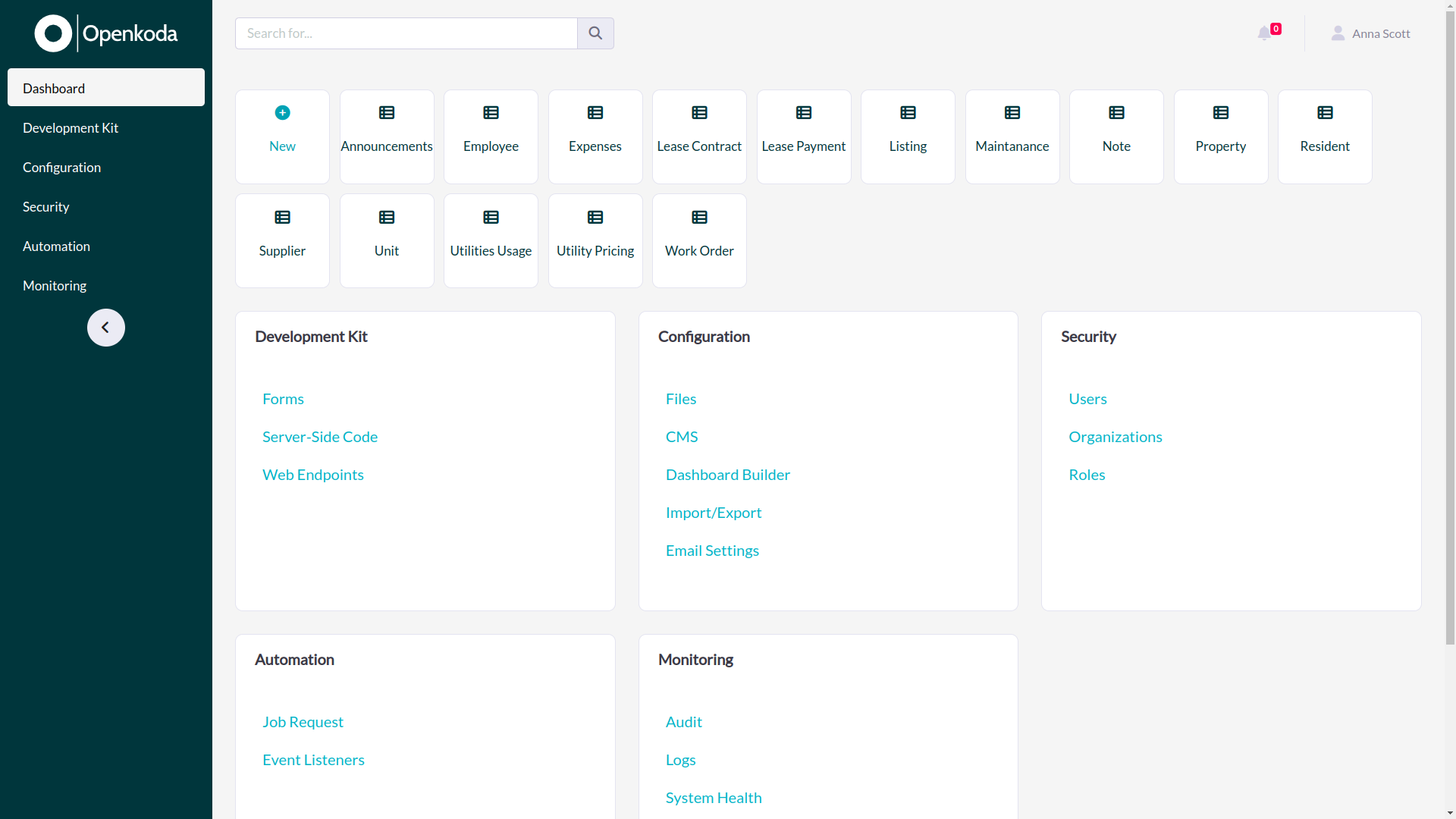
But that’s not all!
Openkoda Property Management Software now includes some advanced AI-driven features, which significantly enhances its capabilities.
- Price recommendation tool: This functionality utilizes artificial intelligence to analyze the pricing trends of similar properties in the market, providing users with data-driven recommendations for setting competitive rent prices. By integrating vast amounts of real estate data and employing sophisticated algorithms, this feature offers precise rent estimations, ensuring that landlords can optimize their rental yields while remaining competitive in the market.
- AI-powered reporting and messaging tools: Leveraging the power of generative AI, this functionality streamlines the process of creating detailed reports and enables you to send personalized messages with just a single click. They save you significant time, making communication and data handling more efficient and tailored to individual needs.
- Automatic document creator: Utilizing the capabilities of artificial intlligence, this tool significantly simplifies your paperwork processes by automatically creating essential documents such as invoices, receipts, and lease agreements. It ensures accuracy and speed, freeing up more time for you to focus on other critical aspects of your business.
These functionalities present a prime example of how to harness AI to optimize pricing, streamline reporting and communication, and automate document creation, enhancing efficiency and accuracy in managing real estate operations.
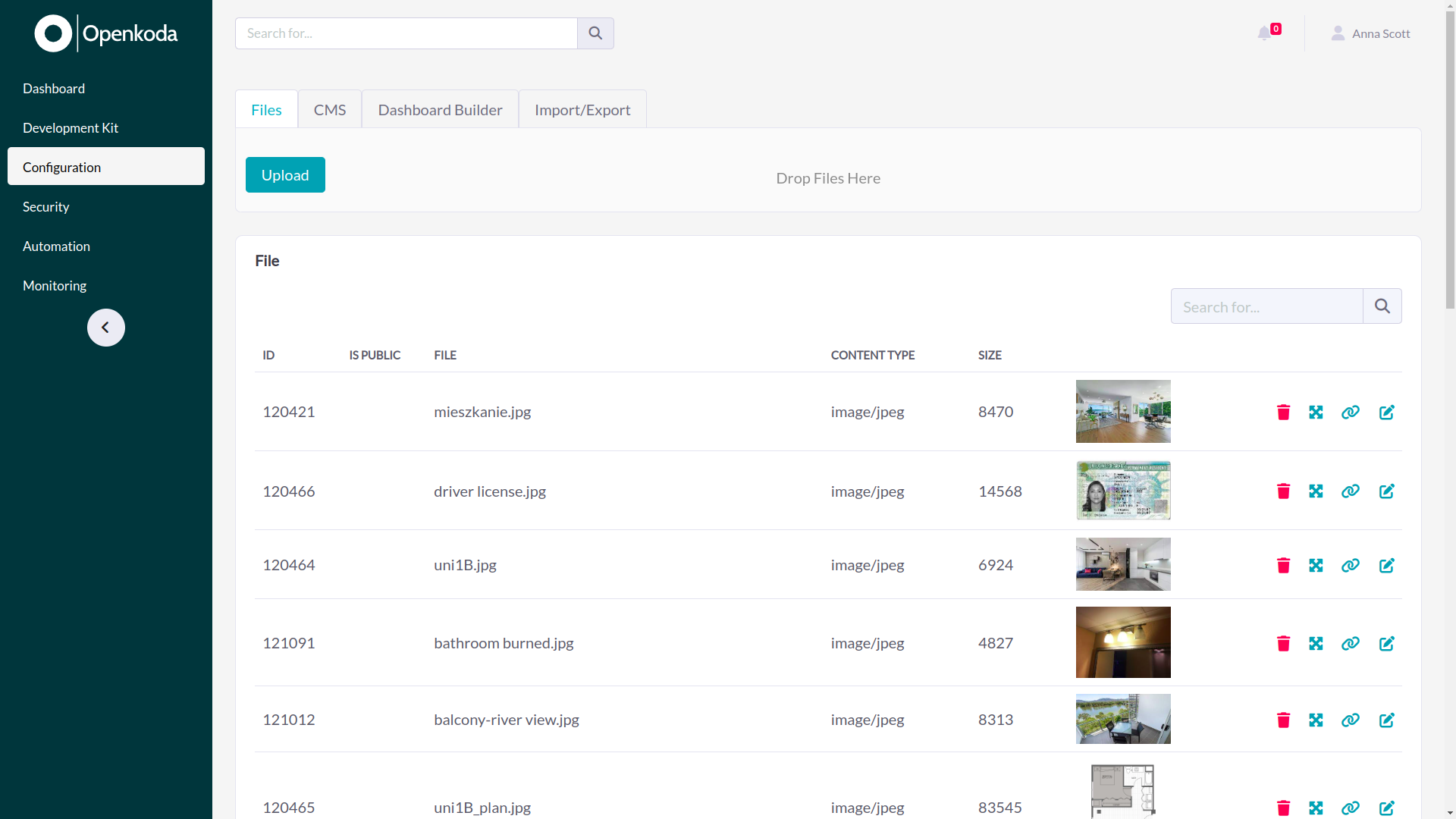
Openkoda leverages modern software architecture and artificial intelligence to offer comprehensive solutions that simplify and enhance the management of rental properties, making it a valuable tool for property managers and landlords and greatly simplifying and speeding up the property management software development process.
Openkoda Property Management System is a comprehensive AI-enabled real estate tool!
Smart Property Recommendations Engines
Smart Property Recommendation Engines are advanced AI-enabled tools used in real estate to suggest properties that best match a buyer’s preferences, similar to how e-commerce sites recommend products.
These engines analyze a variety of factors such as location, price, and property features to provide tailored suggestions.
This personalization helps potential buyers or renters find properties that meet their specific needs quickly and efficiently.
In real estate, the accuracy of these recommendations is crucial because purchasing or renting property is a significant investment.
The value provided by these engines lies in their ability to streamline the property search process, reduce the time spent browsing unsuitable listings, and improve the overall customer experience by making it easier to find the perfect home or investment.
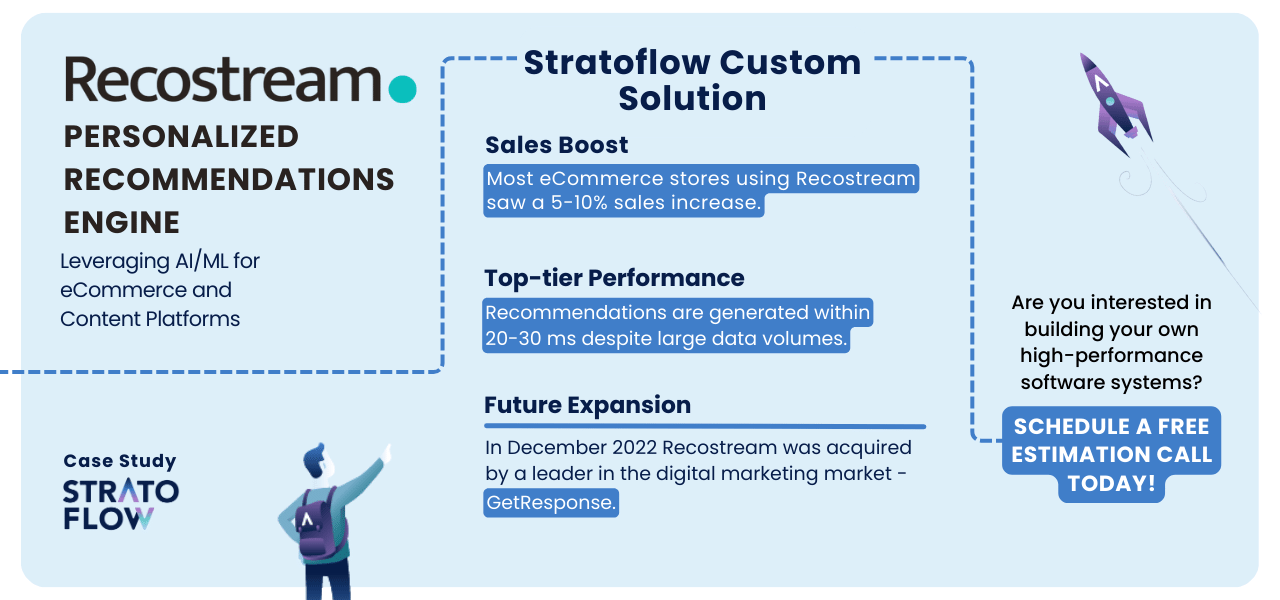
Want to enhance your property listings and drive more targeted leads?
Our custom recommendation engines are designed specifically for real estate businesses like yours.
Click the link below to discover how our tailored solutions can transform your client experience and streamline your operations.
Custom real estate software development services
Rex: AI Voice Assistant

Looking at some more off-the-shelf tools that leverage the latest proptech trends, Rex offers an AI assistant called JobCall that improves communication between property maintenance teams and tenants.
JobCall uses advanced speech recognition technology to transcribe verbal maintenance requests from tenants.
But it doesn’t stop at transcription; the AI categorizes these requests based on urgency and specific needs, allowing maintenance teams to prioritize and address issues more quickly and accurately.
This can lead to significant improvements in response times and tenant satisfaction, as urgent issues are quickly identified and resolved.
AI enables faster responses to tenant needs, which can improve tenant satisfaction and retention. This is especially important in competitive rental markets, where speed of service can be a differentiating factor.
In addition, such AI tools can collect and analyze data over time, providing real estate companies with insights into common maintenance issues, tenant concerns, and operational bottlenecks. Data from logs can be analyzed and used to improve service delivery and operational planning.
[Read also: Top 8 HOA Management Software Solutions: A Comprehensive 2024 Guide]
Compass: AI-enabled CRM System

One of the most time-consuming and resource-intensive tasks of almost any business, regardless of industry, is managing information and communication with customers, and that’s where CRM systems come in.
Customer relationship management (CRM) tools are essential in the real estate industry for managing interactions with clients and streamlining various aspects of the sales process. These tools typically store information about clients, track interactions (such as emails, phone calls, and meetings), and manage property listings.
But this is an area where artificial intelligence can significantly improve the operational efficiency of real estate companies, and that’s exactly what Compass wanted to do with its CRM system.
Compass has integrated AI into its platforms to streamline tasks for real estate agents. Their AI tool, CompassAI, automates content creation for listings, social media, and marketing directly from the Compass data lake, which includes extensive agent and market data.
This integration allows agents to easily generate listing descriptions, create personalized emails, and develop marketing strategies.
The AI also assists with customer re-engagement by analyzing customer data to identify potential sellers, enhancing prospecting efforts.
CoreLogic: AI Real Estate Platform

Another area where artificial intelligence can help is improving the efficiency of listing, buying, and selling commercial and residential properties.
A good example of this is CoreLogic’s AI capabilities embedded in its OneHome platform, which helps real estate agents match buyers with suitable properties.
The platform uses AI to streamline the homebuying document management process, identify missing documents and suggest potential sources of income verification.
This not only speeds up the transaction process, but also reduces errors and improves compliance in real estate transactions.
[Read also: Future of Real Estate: Space as a Service Model]
Virtual Staging and Interior Design
Looking more closely at the prospects of generative AI, virtual staging tools, such as Midjourney, REimagine Home AI or ZMO AI, allow real estate agents, real estate professionals and sellers to digitally furnish a vacant property.
This can make a home more appealing to potential buyers by showing them what each room could look like with furniture and decor without the need for physical staging.
Consider this scenario: A real estate company wants to increase engagement and conversion rates for its online property listings, especially those that appear vacant or minimally furnished.
To accomplish this, they deploy AI-powered virtual staging real estate software for brokers that is integrated directly into their property listing platform. This tool uses generative AI to create realistic and appealing furniture and decor elements that are digitally placed in property photos.
The software offers different design styles to appeal to different aesthetic preferences and demographics, such as modern, traditional, or rustic.
Prospective buyers can interact with the listing by customizing the decor, changing furniture layouts and wall colors, and adding decorative items through the AI interface.
This not only engages customers, but also allows them to visualize living in the space. Using AI in this area simplifies the staging process and reduces costs, providing a flexible and cost-effective alternative to traditional staging methods.

Smart Home Integration
By now, we are all familiar with the term IoT, which refers to the network of interconnected devices that communicate and operate with minimal human intervention.
AI technologies facilitate the integration of smart home devices such as thermostats, lights, and security systems that can be remotely monitored and controlled.
This not only enhances the functionality and appeal of homes, but also promotes energy efficiency and safety.
For example, a smart thermostat can learn a homeowner’s schedule and temperature preferences to optimize heating and cooling, potentially reducing energy costs.
These integrations offer several benefits that can significantly enhance the value proposition for real estate companies:
- Increased Property Appeal: Properties equipped with smart home technologies are often more attractive to potential buyers and renters who value convenience and modern living. Features like smart thermostats, automated lighting, and security systems are appealing because they offer enhanced control, efficiency, and security.
- Higher Property Values: Homes with integrated smart technology typically command higher market prices. The inclusion of these technologies can be a selling point that differentiates a home from others in the market, potentially leading to quicker sales and higher returns on investment.
- Remote Monitoring and Management: For real estate investors and property managers, smart home technologies facilitate the remote monitoring and management of properties. This is especially beneficial for managing rental properties or vacation homes, as it reduces the need for physical presence and can help address issues promptly.
- Marketing Edge: Real estate companies that prominently feature smart homes in their portfolios can position themselves as modern and forward-thinking. This not only attracts clients looking for modern homes but also enhances the company’s brand as a leader in adopting and integrating new technologies.
[Read also: How to Start Real Estate Business in 2024]
Enhanced Lead Generation and Marketing
AI can significantly improve lead generation and marketing efforts for real estate agencies and companies by streamlining processes, personalizing interactions, and optimizing marketing strategies based on data-driven insights.
Here’s how AI can transform these aspects and an example of such a strategy:
Enhancements Brought by AI in Real Estate Marketing and Lead Generation
The integration of AI into real estate marketing and lead generation has transformed the way agencies and companies target prospects and manage data.
AI’s ability to analyze large data sets allows real estate companies to uncover invaluable insights into market trends, customer behavior, and potential hot spots.
For example, AI can identify which neighborhoods are seeing an increase in young families or empty nesters, enabling targeted marketing strategies that resonate with these demographics.
Predictive analytics, a critical feature of AI in this sector, allows agents to anticipate market demand and adjust their inventory and marketing tactics accordingly.
This foresight is especially valuable in volatile markets, where consumer preferences and economic factors can change rapidly.
In addition, AI enables a personalized customer experience on an unprecedented scale. By evaluating past interactions, AI systems can tailor communications to the preferences of individual prospects, increasing engagement and conversion rates.
For example, if data shows that certain customers prefer eco-friendly properties, AI can automatically highlight homes with green certifications in communications with those customers.
This level of personalization not only improves customer satisfaction, but also increases efficiency by prioritizing leads based on their engagement and likelihood to close a deal.
How You Can Introduce AI-Enhanced Lead Generation Marketing Strategy in Practice
So what does an AI-powered marketing strategy look like?
Let’s consider an example: a real estate company that integrates AI with its real estate CRM system to optimize its lead generation and marketing efforts.
By implementing machine learning algorithms, the company can automate and refine the process of scoring leads and segmenting them into different categories, such as first-time buyers, luxury market enthusiasts, or investment-focused customers.
This segmentation enables highly customized marketing campaigns. For example, the company can use AI to send personalized property recommendations and curated content tailored to each segment’s unique interests and budgets.
The company can also deploy AI-powered chatbots on its website and social media platforms to engage with visitors in real time.
These bots can answer common questions, gather preliminary information, and even schedule appointments, ensuring that prospects receive immediate attention, which improves their experience and builds trust.
The AI system continuously learns from interactions, further refining its responses and the information it collects, helping the company effectively tailor its follow-up communications.
By leveraging these AI capabilities, the company not only increases its operational efficiency, but also creates a more engaging and responsive marketing environment.
This strategy not only leads to higher conversion rates, but also establishes a reputation as a technologically advanced and customer-focused broker in a competitive market.
[Read also: Best Real Estate ERP Software Solutions On The Market in 2024]
Prepare for the Future: New Development In The Artificial Intelligence Field
Recent developments in artificial intelligence (AI), particularly generative AI, are poised to have a significant impact on the real estate market.
Generative AI, which has capabilities ranging from image creation to text generation and more, is increasingly being integrated into various facets of real estate, from property listings to architectural designs.
For example, generative AI can optimize architectural plans by analyzing data from IoT sensors and computer vision to understand space utilization, which can help design more efficient and appealing building layouts.
The market for generative AI in real estate is expected to grow significantly, reaching approximately $1,047 million by 2032.
This growth indicates a robust integration of AI technologies in the sector, driven by its potential to streamline operations from construction to property management.
In terms of marketing and sales, platforms like Sora will soon allow you to leverage generative video capabilities to create dynamic video content that showcases properties in a more engaging and informative way. This not only enhances the presentation of listings, but can also provide a richer, more interactive customer experience.
However, as the adoption of generative AI grows, real estate companies must also address potential challenges such as data inaccuracies and regulatory changes.
It’s critical for companies to establish strong policies and governance frameworks to mitigate these risks and fully realize the benefits of AI.
Related Posts
Thank you for taking the time to read our blog post!

